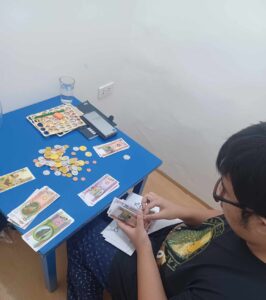
In this engaging program, we aim to empower young minds with the essential tools to navigate the financial landscape. Just like learning to ride a bike or mastering a new game, understanding money is a skill that can be both enjoyable and rewarding.
Our interactive sessions are designed to make financial concepts easy to grasp, turning what may seem complex into a series of exciting adventures. From learning about the coins jingling in your piggy bank to making informed choices when spending, each lesson is crafted to instill a lifelong understanding of financial principles.
Here are some key reasons why teaching financial literacy to children is valuable:
1. Early Financial Habits: Introducing financial concepts at a young age helps children develop positive financial habits. Understanding the value of money, budgeting, and saving early on can lay the foundation for responsible financial behavior in adulthood.
2. Budgeting Skills:
Financial education helps children grasp the concept of budgeting. They learn to allocate their resources wisely, whether it’s a weekly allowance or money earned through chores.
3. Budgeting Skills: Learning about budgeting helps children understand the concept of limited resources and the importance of prioritizing needs over wants. These skills are crucial for managing money effectively in the future.
4. Saving and Investing: Teaching children about saving and investing instills a sense of delayed gratification. It helps them understand that saving for the future and making wise investment decisions can lead to financial security and wealth accumulation over time.
5. Understanding Credit: Financial literacy educates children about the concept of credit and debt. They learn about responsible borrowing, the importance of maintaining good credit, and the potential consequences of excessive debt.
6. Entrepreneurship: Financial literacy can also foster an entrepreneurial mindset. Children may learn about starting businesses, managing finances in a business context, and the value of innovation and hard work.
7. Crisis Management: Understanding financial concepts equips children with the skills to navigate financial challenges and crises. This includes dealing with unexpected expenses, emergencies, or economic downturns.
8. Building Confidence: Financial literacy empowers children to take control of their financial future. Understanding how money works gives them confidence in making financial decisions, leading to a sense of independence and self-reliance.
9. Preparing for Adulthood: As children grow into young adults, they will face various financial decisions, such as managing student loans, renting or buying a home, and planning for retirement. Financial literacy prepares them for these adult responsibilities.
10. Breaking the Cycle of Financial Illiteracy: By instilling financial literacy in children, there is a potential to break the cycle of financial illiteracy. Educated children are more likely to pass on their knowledge to future generations, creating a positive impact on overall financial well-being.
In summary, teaching financial literacy to children is an investment in their future well-being. It equips them with the knowledge and skills necessary to navigate the complexities of the financial world, make informed decisions, and achieve financial success.
